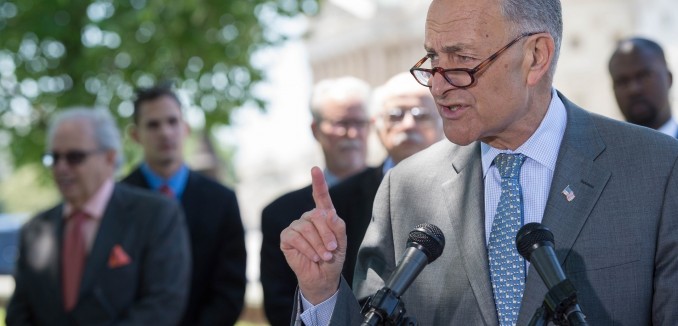When the United Nations Security Council voted on December 23rd to approve Resolution 2334, which criticized Israeli construction activity in eastern Jerusalem and the West Bank, they became only the latest in a series of UN bodies to take aim at Judaism’s holiest city. Two months earlier, UNESCO, the UN’s cultural organization, beat the Security Council to the punch with a resolution describing the Temple Mount and the Western Wall as purely Muslim holy sites. That the UN has never been a particularly friendly environment for Israel or the Jewish people is no surprise. What was a surprise, however, is that in this latest round of UN-driven anti-Israel animus, the United States, for the first time during the Barack Obama presidency, played along by abstaining from the vote rather than vetoing it. In a particularly cruel move, the Security Council vote was held just hours before the start of Chanukah, which commemorates the rededication of the Temple in the very part of Jerusalem that the UN now says Israel has no claim to.
The Obama administration made substantial efforts to create the appearance that its abstention wasn’t an endorsement of everything in the resolution. In a rambling follow-up speech setting out his vision for peace in the region, Secretary of State John Kerry argued for policies that were contradicted by 2334 itself. For example, Kerry said that the U.S. understands that “some” settlements—likely a reference to Jerusalem’s suburbs—will be part of Israel in a two-state solution, even though 2334 makes no such distinctions, calling those areas occupied territory that must become part of a Palestinian state in the absence of a mutually-acceptable agreement.
But evidence has since come to light that the White House actually worked to ensure the resolution’s passage, including an effort by Vice President Joe Biden to pressure Ukraine’s president to make sure that his country voted “yes.” This has signaled to many that the Obama administration may continue to make dramatic shifts in U.S. policy towards Israel and the Israeli-Palestinian conflict, and look to take actions at the UN that will be difficult for future administrations to undo because they will become part of a new international consensus. The danger in doing this through the UN, of course, is that the UN is where Israel’s enemies—many of whom are America’s enemies as well—can do the most damage by undermining Israeli sovereignty and chipping away at perceptions of legitimacy of Jewish claims to Jerusalem and Israel.
America’s abstention drew disapproval and anger from some of Obama’s Democratic colleagues, many of whom have also been critical of actions taken by the current Israeli government. Following the vote, party leaders, including Senate Minority Leader Chuck Schumer (D-N.Y.), House Minority Whip Steny Hoyer (D-Md.), and the ranking Democrats in both chambers’ foreign affairs committees, all made strong statements condemning Obama for not sticking up for Israel, for letting the UN walk all over the Jewish people, and for breaking with a generation of U.S. policy that worked aggressively for bilateral negotiations and against counterproductive and disingenuous UN action. Even George Mitchell, Obama’s former Middle East envoy and an influential player in making peace in Northern Ireland, said that he would have advised Obama to veto 2334.
President Obama’s defenders point to record levels of defense aid given to Israel as proof that he’s been a strong pro-Israel president. But this argument is delivered without an appreciation, or even acknowledgment, for how much Obama’s diplomatic actions have weakened Israel, which only increases the amount of money Israel must spend on its physical security.
Completely absent from the administration’s considerations, for example, is the reality that Palestinians launched wars against Israel following each and every one of Obama’s efforts to restart negotiations, efforts which began by exerting levels of pressure that were historically higher on Israel and historically lower on the Palestinian Authority. President Obama’s legacy in regard to the Israeli-Palestinian conflict is a conscious drift away from generations of bipartisan U.S. policy, which in turn has contributed to declining support among Israelis and Palestinians for the two-state solution.
A result of Obama’s approach to the conflict is the split it has caused in the Democratic Party over American support for Israel and its role in finding a resolution. Centrist Democrats who condemned Obama over 2334 and continue to believe in the two-state solution are making arguments that not too long ago were overwhelmingly shared within the party. However, the events of the last month, coupled with the rise of figures like Bernie Sanders and Keith Ellison, who have both repeatedly stated that the U.S. is too pro-Israel, raise legitimate questions over whether the Democratic Party can retain its decades of support for both Israel and the two-state solution simultaneously. If Obama decides to pursue another effort to weaken Israel before he leaves office, it may be impossible for pro-Israel Democrats to remain at ease with their party.
Aaron Menenberg is the Executive Director of the Public Interest Fellowship. He also covers foreign policy and energy for Roubini Global Economics’ The Economonitor, and is a member of the Foreign Policy Initiative Leadership Network Council. Aaron formerly worked as the Director of Congressional Affairs at the Israel Allies Foundation, was a 2010-2011 Menachem Begin Heritage Center Israel Government Fellow, and worked with the Civil Administration at the Israel Defense Forces and Civil Administration base in Beit El.
[Photo: Senate Democrats / flickr]




